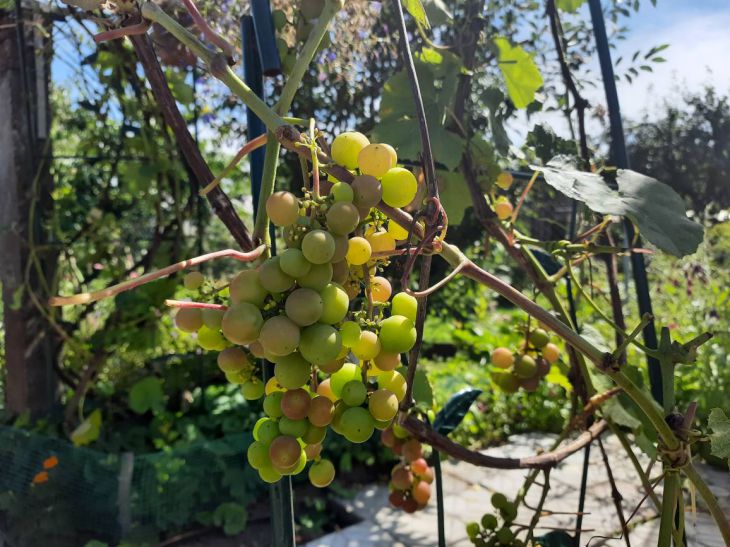What to do with grapes in early spring to have a good and large harvest
In spring, gardeners begin to improve crops, especially grapes. We suggest finding out what needs to be done to ensure a good harvest in the summer.
Remove the cover and inspect the vines.
The cover is removed after the snow has melted and the temperature does not fall below 5 degrees below zero, and the soil has dried out.
If there are temperature fluctuations, the plant is uncovered, but the vines are not removed from the trench so that they are not damaged by wind and cold.
Be sure to inspect the bush and treat it with a special paste against damage. If there is mold, do not worry, it will disappear in the fresh air.
Cut the vine
As soon as the air temperature is stable, before the sap starts to flow, the vines need to be pruned.

Usually gardeners do this at the end of April, but if the grape variety is frost-resistant, then pruning can be done as early as March.
First, remove damaged, diseased, frostbitten, too thin, thick and old shoots.
Then the vine is formed by cutting off the shoots so that up to 15 buds remain. This procedure requires a sharp and disinfected pruning shears. The cuts should be even, without cracks or kinks. Each cut is also processed.
Treat grapes from diseases and pests
In spring, the vine needs to be treated against pests and diseases. This treatment should be carried out as early as possible, then the plant will be more protected. The procedure is carried out for the first time during tying up the vine.
For this, you will need a 3% solution of copper sulfate. This will protect the grapes from harmful insects. The vine is treated for the second time when buds are formed. Ready-made solutions are used for this.
The treatment will provide protection against various diseases. The third time the treatment is carried out on the 12-15th leaf. This is done to protect the plant from the grape mite. The following preparations will help with this. "Aliot" or "Fitoverm".
At the same time, summer residents with many years of experience, based on materials on grape processing schemes authored by Vadim Tochilin and Yuri Egorutin, note that there is no processing by 12 leaves, but there is by 3-5 leaves. Otherwise, you can ruin your vineyard.
Top dressing
To ensure a good harvest, grapes need additional feeding. The first is done when the buds begin to swell.
It is better to use a mineral-nitrogen complex for this, which contains superphosphate, potassium and urea in a proportion of 60 g, then it must be diluted in 50 liters of water. A 5% solution of bird droppings is also suitable as a top dressing.
The second time the grapes are fed is when the flowering period begins.
The fertilizer should contain superphosphate and potassium sulfate. When flowering is over, the grapes are not left without fertilizer.
Mix 50 grams of urea and 60 grams of superphosphate per 10 liters of water. Spray the grapes with the solution.
Vineyard expansion
In May, you can start renewing or expanding your vineyard. Plant new seedlings, either prepared by yourself or purchased.
The soil temperature should be 10 degrees Celsius. Grapes need special care and attention, then the harvest will be good.
